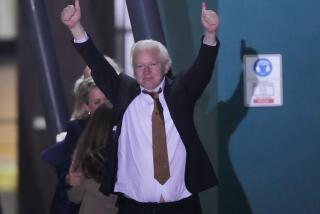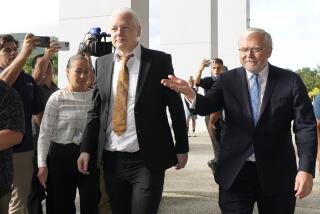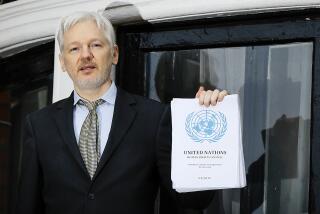WikiLeaks’ Julian Assange released on bail
Reporting from London — After nine days in jail, Julian Assange was released on bail Thursday by a British judge who ruled that the controversial WikiLeaks founder could fight extradition to Sweden over sex-crimes allegations from the confines of a friend’s country estate.
Assange was released Thursday evening after paying nearly $375,000 in cash up front in bail and giving other financial assurances. In a sign of how politically charged the case is, the courthouse in downtown London stayed open late so the 39-year-old Australian could complete the required paperwork and emerge a free man.
“It’s great to smell [the] fresh air of London again,” Assange said triumphantly on the courthouse steps, as fat snowflakes swirled in the air and admirers cheered. He thanked his supporters, his lawyers and the British legal system, “where if justice is not always an outcome, at least it is not dead yet.”
Assange now swaps what his lawyer called the “Dickensian conditions” of a south London jail for the comforts of a 10-bedroom manor on 600 acres of prime English countryside. The sprawling estate of Ellingham Hall, northeast of London, is owned by a friend who had vouched for Assange in court.
But the terms of Assange’s bail require him to surrender his passport, abide by a curfew and report daily to police. He must also wear an electronic tag so authorities can monitor his movements.
He is due in court early next month and again in early February for hearings on his potential extradition to Sweden, where authorities want to question him over allegations of molestation, unlawful coercion and rape stemming from encounters he had with two women in August.
Assange denies any wrongdoing, saying that the case is politically motivated, possibly at the direction of U.S. officials angry over WikiLeaks’ release of secret State Department and Pentagon documents. But Swedish prosecutors insist their case has nothing to do with his whistle-blowing website.
Before leaving London for what his own lawyer called “mansion arrest,” Assange said he was worried about what might happen if the United States succeeded in getting its hands on him. There are reports that American officials are exploring ways to charge him with espionage.
“I don’t have too many fears about being extradited to Sweden. There are much bigger concerns about being extradited to the United States,” Assange told reporters before an assistant pulled him away, saying: “We have to meet your curfew.”
Sweden’s extradition request could take weeks, possibly months, to resolve.
Going into Thursday’s high court hearing, there was a possibility that Assange would have had to spend the duration of that time at Wandsworth Prison, where he had been placed in solitary confinement after turning himself in to police in London on Dec. 7.
On Tuesday, a lower court judge granted bail for Assange, with strict conditions. That decision, however, was appealed, which forced Assange to remain in jail another 48 hours. (It remained unclear Thursday evening whether the appeal had been brought by British or Swedish prosecutors.)
In the high court, Assange’s lawyers repeated their argument that he posed no flight risk and would find it hard to be a successful fugitive now that his face was known the world over. A number of high-profile personalities, including British movie director Ken Loach and American filmmaker Michael Moore, offered to act as guarantors of his bond.
Prosecutors objected, saying that Assange lived a “nomadic” lifestyle that made it a “real risk” he would try to abscond. At the lower court hearing this week, Assange even tried giving a post office box as his address before being told it was unacceptable. He then provided the street address of a residence in Australia.
The high court judge, Justice Duncan Ouseley, noted that Assange had been cooperative with British authorities from the time of his arrival here some weeks ago, aware that the allegations in Sweden were hanging over him.
“That is not the conduct of a person who is seeking to evade justice,” Ouseley said. He upheld the earlier bail decision, which set off a scramble among Assange’s lawyers to submit the necessary funds and complete formalities for their client’s release before the courthouse closed.
“We’re utterly delighted with the result here today,” lawyer Mark Stephens told reporters, adding: “He will not be going back to that Victorian prison.”
Instead, he will be enjoying “a slice of Georgian splendor,” as one newspaper put it, on a manorial estate that belongs to Vaughan Smith, a former soldier who founded the Frontline Club for journalists in London. Assange lived at the club for a brief period before his arrest last week.
Smith’s historic 18th century country home boasts its own organic farm and household staff. Its expansive grounds will offer Assange “some peace and some security,” Smith told Sky News. “It’s quite hard to actually get too close without trespassing.”
Assange will also have unfettered access to the Internet once again after nine days of limited contact with the outside world. His lawyers said he was given little exercise time in jail and had to rely on the down-market Daily Express tabloid for news.
His mother, Christine, who flew in from Australia to attend the bail hearings, expressed relief that her son had been freed.
“I’m very, very happy with the decision,” she said. “I can’t wait to see my son and to hold him close. I had faith that the British justice system would do the right thing.”
More to Read
Sign up for Essential California
The most important California stories and recommendations in your inbox every morning.
You may occasionally receive promotional content from the Los Angeles Times.











